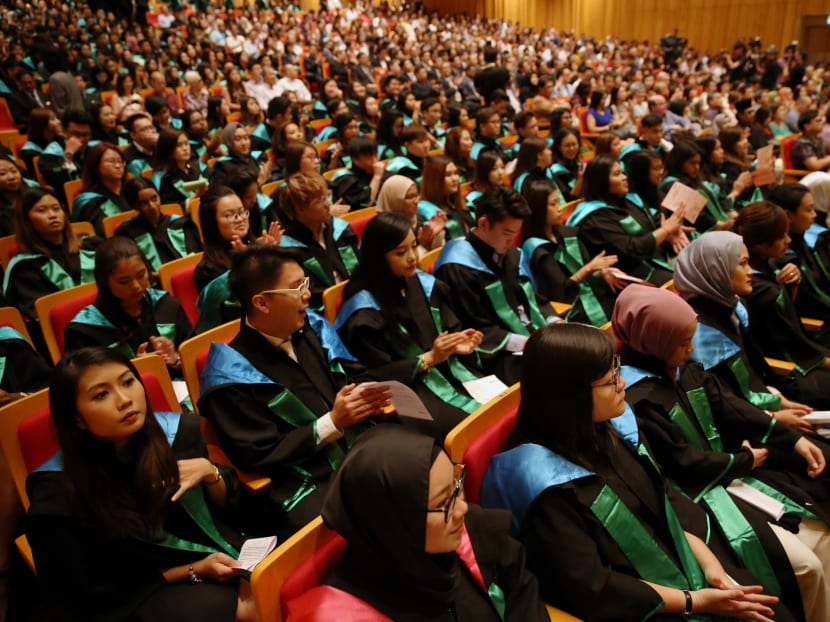Graduates to get fraud-proof, convenient digital certificates
SINGAPORE — “Unsavoury characters” submitting forged certificates or degrees from Singapore institutions will quickly find themselves thwarted, as the Republic is issuing highly secure digital certificates to all graduating students from this year.

Graduates will receive an email containing a link to their digital certificate, and this will be added automatically into their SkillsFuture account if they are existing users.
SINGAPORE — “Unsavoury characters” submitting forged certificates or degrees from Singapore institutions will quickly find themselves thwarted, as the Republic is issuing highly secure digital certificates to all graduating students from this year.
Announcing the development at Temasek Polytechnic’s graduation ceremony on Friday (May 3), Education Minister Ong Ye Kung said the digital certificates, called OpenCerts, which will be given to students alongside the traditional physical ones, will also provide more convenience.
“It allows for any education institute to issue OpenCerts, and for anyone to quickly check the validity of a digital certificate. This will in time make job application and hiring easier and smoother for both the applicant and the employer,” he said.
A job applicant would no longer need to go through the hassle of requesting for certified true copies of their diplomas or degrees from their institutions, he added.
“You can send potential employers your digital diploma together with the job application. Employers can immediately validate the digital diplomas received as genuine, because that is what blockchain offers — secure and immutable records.”
OpenCerts will also help to reduce fraud, Mr Ong added.
“With OpenCerts, any unsavoury characters submitting forged certificates or degrees from Singapore institutions to try and get a job will be quickly found out and denied. It is a good solution to a real-world problem.”
Between 2016 and 2018, the Manpower Ministry caught 33 foreigners for submitting forged certificates in connection with work pass applications.
But the problem is not unique to Singapore. Last year, a BBC investigation found that thousands of UK nationals had bought fake degrees from a "diploma mill" in Pakistan.
OpenCerts, which marks the first time that blockchain technology is being used at a national level, has been jointly developed by SkillsFuture Singapore (SSG), Government Technology Agency (GovTech), Ngee Ann Polytechnic (NP) and the Ministry of Education.
Students receiving a digital certificate this year include:
O-Level, N-Level and A-Level graduates
Institute of Technical Education graduates
Polytechnic graduates
LASALLE College of the Arts and Nanyang Academy of Fine Arts graduates
Local university graduates
National Institute of Early Childhood Development graduates
Foreign graduates from the partner institutions this year will be able to create a MySkillsFuture account and access their digital certificates by the end of the year. These certificates will be consolidated into a Skills Passport, where users can track their qualifications in their account.
Other digital certifications that will be included in the Skills Passport includes Singapore Workforce Skills Qualifications certifications, as well as SkillsFuture courses organised by partner institutions.
Users can also expect to access digital copies of their past certifications in their Skill Passport, but a more concrete timeline is still under discussion.
“With the OpenCerts, you can see we issue about 5,000 (digital certificates) in two minutes,” said NP innovation and entrepreneurship office director Patrice Choong.
It takes around 1,250 hours to print and verify physical true copies of the same number of certificates, Mr Choong added.
A pilot batch of some 5,000 NP graduates were the first to receive OpenCerts last year.
NP graduate Dawn Lee, 21, who was part of this pioneer batch, felt that physical graduation certificates still have their place. “When the (physical) certificate was presented to me, I felt like I really achieved something,” she said.
HOW IT WORKS
Graduates will receive an email containing a link to their digital certificate, and this will be added automatically into their SkillsFuture account if they are existing users.
Jobseekers can send their certificates to potential employers via email. To verify the authenticity of the transcript, employers can simply drag and drop these files onto the website OpenCerts.io.
The document will undergo a four-step verification to check the following:
The certificate has not been tampered with.
The certificate has been issued.
The issuer of the certificate has been identified.
The certificate has not been revoked.
Each digital certificate contains a unique cryptographic proof embedded in it, like a fingerprint. This will be corroborated with its code on the blockchain for any signs of tampering and cross-checked with a revocation list as well.
The process is completed in a few seconds, with tampered files being highlighted on the platform.
SSG chief executive Ng Cher Pong said: “Employers will have a reliable source to verify certificates submitted by candidates and employees.”
MOVING FORWARD
Using blockchain is more secure than conventional means, where a centralised server is needed to store details within the certificate, which makes it more vulnerable to breaches, said GovTech government digital services director Steven Koh.
“We don't store academic records of the certificate and personal data are not published on the blockchain, so it's more secure,” added Mr Koh.
Blockchain is a tool for digitally recording transactions between two parties and it is not owned or maintained by an individual, which ensures that records made cannot be altered or destroyed by an individual.
Mr Koh said “quite a few” governments and schools from several countries are interested in such a framework, and added that such digital certifications can be used in other areas such as marriage and birth certificates.
“There are many possibilities that we are exploring right now,” he said.









